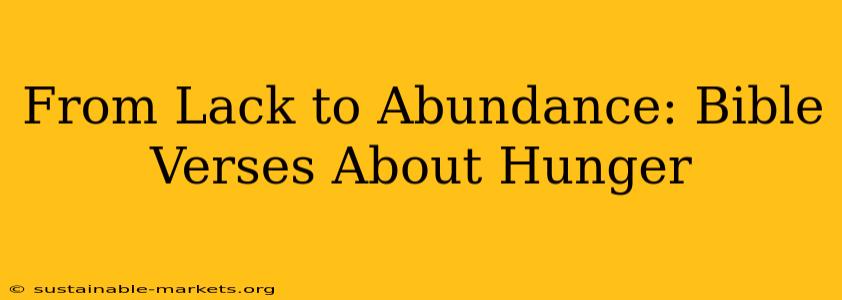The Bible, a rich tapestry of human experience, frequently addresses the issue of hunger, not merely as a physical need but as a metaphor for spiritual emptiness and the yearning for God. Understanding the biblical perspective on hunger provides profound insight into God's provision, compassion, and the ultimate promise of abundance. This exploration delves into key scriptures, examining both the literal and metaphorical interpretations of hunger within the biblical narrative.
What are some Bible verses about overcoming hunger?
Many verses speak to overcoming hunger, both literally and spiritually. Let's look at a few examples:
-
Psalm 23:1: "The Lord is my shepherd; I shall not want." This foundational verse emphasizes God's provision as a shepherd cares for their flock. It transcends physical hunger, signifying a complete lack of want—spiritual, emotional, and material.
-
Psalm 37:25: "I have been young, and now am old; yet have I not seen the righteous forsaken, nor his seed begging bread." This verse offers reassurance and hope, promising God's sustained provision for those who live righteously. It speaks to the long-term security and sustenance God provides.
-
Proverbs 10:3: "The Lord will not suffer the soul of the righteous to famish." This proverb reinforces the promise of God's care, specifically mentioning the righteous, highlighting the importance of living a life aligned with God's will.
-
Matthew 6:33: "But seek ye first the kingdom of God, and his righteousness; and all these things shall be added unto you." This verse highlights the importance of prioritizing spiritual growth. While not a direct promise of food, it suggests that focusing on God's will often leads to material blessings as well, including freedom from hunger.
How does the Bible describe spiritual hunger?
Spiritual hunger, often described as a yearning for God, is a recurring theme. It's not merely a lack of faith but a deep longing for connection with the divine. Several verses capture this aspect:
-
Matthew 5:6: "Blessed are those who hunger and thirst for righteousness, for they will be filled." This verse portrays spiritual hunger as a blessed state, promising fulfillment for those who earnestly seek righteousness. It suggests that spiritual hunger is a necessary precursor to spiritual satisfaction.
-
John 6:35: "And Jesus said unto them, I am the bread of life: he that cometh to me shall never hunger; and he that believeth on me shall never thirst." Jesus here identifies himself as the ultimate source of sustenance, eliminating spiritual hunger and thirst through faith and connection with him.
-
Isaiah 55:1: "Ho, every one that thirsteth, come ye to the waters, and he that hath no money; come ye, buy, and eat; yea, come, buy wine and milk without money and without price." This verse extends an invitation to all who are spiritually thirsty, emphasizing the freely available spiritual nourishment offered by God.
What does the Bible say about sharing food with the hungry?
The Bible frequently emphasizes the importance of compassion and sharing with those in need, particularly the hungry.
-
Deuteronomy 15:7-8: "If among you, one of your brothers should become poor, in any of your towns within your land that the Lord your God is giving you, you shall not harden your heart or shut your hand against your poor brother, but you shall open your hand to him and lend him sufficient for his need, whatever it may be." This passage emphasizes the responsibility of the community to care for its members, illustrating the importance of material generosity.
-
Proverbs 19:17: "Whoever is kind to the poor lends to the Lord, and he will reward them for what they have done." This verse highlights the spiritual reward for acts of charity towards the hungry and poor, linking material generosity with spiritual blessings.
-
Proverbs 22:9: "He who has a bountiful eye will be blessed, for he shares his bread with the poor." This proverb connects generosity and sharing with blessings, suggesting that helping others in need brings its own rewards.
How can we apply these verses to our lives today?
The Bible's teachings on hunger are timeless and relevant. They call us to:
-
Cultivate a heart of gratitude: Recognizing God's provision, even in the midst of scarcity, fosters contentment and strengthens our faith.
-
Practice generosity: Sharing our resources with those less fortunate reflects God's love and compassion.
-
Seek spiritual nourishment: Prioritizing our relationship with God fills the spiritual void and provides lasting sustenance.
-
Advocate for justice: Addressing systemic issues that contribute to hunger requires action and commitment.
The Bible's message concerning hunger isn't just about avoiding physical starvation; it's a profound call to live a life of faith, compassion, and generosity. Understanding these scriptures enriches our understanding of God's character and empowers us to make a tangible difference in the lives of others.

